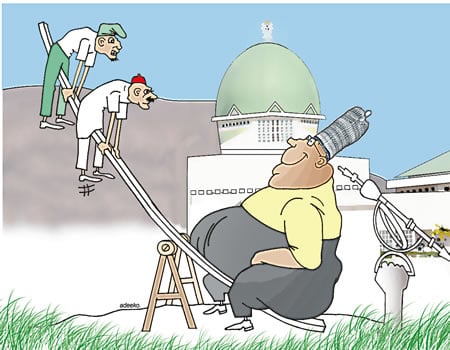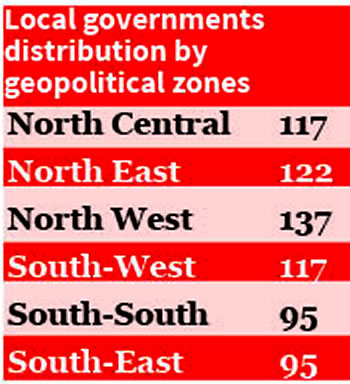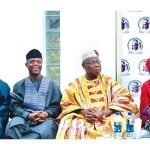In this report, KUNLE ODEREMI, BOLA BADMUS and YINKA OLUKOYA write on the planned delineation of constituencies by the Independent National Electoral Commission (INEC) and the controversies already brewing among the leaders of thought in geopolitical zones of the country, who believe that the exercise might not correct perceived injustice in the system.
A cardinal principle of federalism is about the existence of a coordinate arrangement among the constituent units of a state. The concept describes a circumstance where different nationalities willingly form a union under mutually agreed conditions. Kenneth C. Wheare (1963), in his timeless book, Federal Government, succinctly defines the political concept thus: “Federalism is a constitutional arrangement in which law-making powers and functions are divided among tiers of government in such a way that within its respective sphere of jurisdiction and competence, each government is independent or autonomous and co-ordinate. A cardinal principle of Federalism is that there is no subordinate government, even though there may be two or more state governments.”
But in practice, many believe Nigeria’s model of federalism negates this cardinal principle of coordinate arrangement. With its awesome power, the centre acts like a behemoth with all the other federating arms at its whims and caprice. The mesh of contradictions traverses the master-subordinate relationship, as mechanisms that ought to guarantee power equilibrium are consistently undermined.
Under the 1999 Constitution, there ought to be periodic review of delineation of state and federal constituencies intervals not less than 10 years as enshrined in Section 73 (1) and 114 (1) or as may be considered necessary in the event of boundary adjustment or creation of new states and local governments under Section 3 of the Constitution (Sections 73 (2) and (114 (2). The objectives of the drafter of the constitution was to make sure equity, justice and fairness in the political structure and architecture of the country. It was designed to guide against a situation, where one section of the country would dominate the rest of the country or promote lopsided representation.
Today, the pervasive crises in the country are because of the gamut of manifestations of injustice that cuts across many spheres. For instance, the political configuration at the National Assembly is skewed in favour of a section of the country. The three zones in the North has 19 states to the 17 that make up the three zones in the South. The North boasts of more representatives in the House of Representatives, just as majority of the 774 local government in the states and the Federal Capital Territory (FCT) are located in the North. The lopsidedness and disequilibrium is further graphically seen in the distribution of positions and membership at the huge number of committees in both the Senate and the House, designed to facilitate effective and efficient legislative business of the National Assembly.
However, the spirit of Section 72 of the Constitution is aimed at ensuring equal representation of each state of the Federation in the National Assembly, based on three (3) Senators per state. It states: “No Senatorial district or Federal constituency shall fall within more than one State, and the boundaries of each district or constituency shall be as contiguous as possible and be such that the number of inhabitants thereof is as nearly equal to the population quota as is reasonably practicable.
In determining issues concerning delineation of constituencies, population forms the fulcrum, whereas headcounts conducted in the country tend to give a comparative advantage to the North.
Each exercise has always been trailed by deep-seated anger and controversies with particularly stakeholders from most of the ethnic nationalities crying blue murder over manipulation and falsification of the figures. Some schools of thought argue that it is illogical for an arid land, though vast, which naturally cannot provide a more clement weather year round for human habitation, should have a thick population than a part of the country that enjoys an almost year in year out clement climate for human habitation and procreation, as well as a conducive environment for investors and business to thrive, as well as planning. But another strand of the argument is that given the land size of the South, when compared with the North, it can only have a dense population but not large population. Other commentators have introduced other dimensions to the general disputation, one of which is premised on customary and religious practices, with some schools of particularising the propensity for unfettered procreation by one of the political divides.
The indices for distribution of the national cake also constitute a major source of conflict of interest among the components of the country. Emphasis is more about sharing of the proverbial national cake, as opposed to the individual contribution and role in the actual baking of the cake. The contention is that the South, which contributes the largest chunk of the commonwealth, has been made to always hold the shortest end of the spoon at the dining table as far as the federal allocation formula is concerned.
INEC’s intervention
The members of the Committee on Review of Electoral Constituencies were Amina Zakari, a national commissioner, as chairman; AVM Muazu, another national commissioner, member; Kayode Oladimeji, Osarobo O Osarobo, Maryam Musa, John Egharevha, all members, as well as Abdulhadi Lawal, (secretary) and Muyiowa Oshufele. The terms of reference of the electoral constituencies included: (i) Review the status of the Commission’s past and recent attempts at delimitation of constituencies and make recommendations on the way forward; (i) Review and advice on INEC collaboration/MoU’s with National Population Commission, National Space Research and Development Agency, National Broadcasting Commission, Office of The Surveyor General of the Federation, National Boundary Commission, Nigerian Postal Service and any other relevant government agency.
(iii) Review existing delimitation guidelines and develop new guidelines for delimitation/delineation of the federal constituencies to meet the demand of the current state of the Nation.
The members of the Committee on the Review of Polling Units and Registration Areas are: Professor Okey Ibeanu as chairman; Taminu Inuwa, Kingsley Onyeri, Bayode Lawrence, Tambaya Abdul, Ushie Godwin, as secretary, as well as Seun Ogundeji and Tolutope Oje. The terms of reference of the committee include to consider the current status of Polling Units and Registration Areas nationwide; propose a framework and criteria for review and recommend a plan of action for Commission’s approval.
The members of the Committee on the Review of Suppressed Constituencies are Professor Adedeji Soyebi as chairman; Mallam Mohammed Haruna, Tambaya Abdul; Nanamdi Nweze as members, while Ewa Valentine is the secretary, just as Sanusi Ibrahim. The terms of reference included to determine the status of suppressed state constituencies; review existing Court Orders in this regard and develop Guidelines for implementation.
The constitution mandates the National Population Commission (NPC) to conduct headcounts every 10 years. The exercise is apparently a precursor to delineation of constituency. But, the head count remains one of the most knotty in the affairs of the country because of political undercurrent instead of the underlying objectives of a census, which is to generate necessary data for national planning, economic growth and development. However, the figures usually generated from the exercise are usually subjected to high wired political intrigues and manipulation with the resultant crisis of confidence in the application and adoption for major official policies and programmes, including the delineation of constituencies.
Mass-based organisations like Afenifere; Ohanaeze Ndigbo; South-South Peoples Assembly, South-South Leaders Forum and the Middle Belt Forum have led the agitation against the skewed representation at the National Assembly. The preponderance of inter-ethnic conflicts, boundary disputes has been blamed on the act of injustice, as some nationalities claimed of being marginalised in major political calculations and allocation of resources, having been deprived of a strong bargaining power. But, how far can INEC go in addressing the core issues in the latest move? What arrangements or plans do the commission to seek out the ‘aggrieved’ major stakeholders in the Nigeria project over the assignment of the eight-man committee? How will the National Assembly treat the INCE report when it gets to the legislative arm of government, given its present defective membership structure or configuration?
In his view, the former chairman, Presidential Advisory Committee on National Conference, Senator Femi Okurounmu, described the plan by INEC to delineate federal constituencies as premature and ill- considered.
Okurounmu contended that before any delineation could be carried out, a proper population census must be put in place to give account of areas where there are population shift.
He also said that the electoral body under the chairmanship of Mallam Yakub Mahmud could not re-delineate without being biased. He said: “My view is that any plan to delineate federal constituencies or any constituencies for that matter at this point in time is premature, ill- considered and possibly ill-motivated.
“This is because the purpose of re-delineating constituencies in a democracy is to take account of population shift so that areas which have experienced a lot of influx of new population can have an increase in their number of constituencies and vice versa. But, such population shift can only be determined by a credible population census.
“In the absence of any such census, there is no objective basis whatever for re- delineating constituencies. That is putting the cart before the horse. It is possibly ill- motivated because the present INEC is least qualified to embark on such exercise given the fact that the Chairman of INEC not only comes from the same zone as the President, but he is in fact is relation.
“Therefore, it marks of an attempt to re-delineate the constituencies to favour the incumbent who is already making plans to run for a second time. All these make the effort to appear more fraudulent.”
Also speaking, the national secretary of the KOWA Party, Comrade Mark Adebayo, acknowledged that it was part of the constitutional responsibilities of INEC to carry out constituency delineation from time to time, saying: “While the constitutional responsibilities of INEC as Nigeria’s electoral management body are eminently acknowledged, it, however, behoves on the commission to live above board in the exercise of its mandates.
“KOWA Party calls on the recently set up committee on constituency delimitation to ensure openness, equity, and justice in the exercise of its assignments.”
The party chieftain, who said the need for the exercise embarked upon by INEC was informed by population increase in the country, however, urged the INEC Delimitation Committee to ensure that no part of the country was shortchanged. He called on the committee to resist pressures from all quarters to engage in gerrymandering, which he described as ultimate killer of democracy.
“It is understandable that as populations increase, constituency re-delimitation becomes politically and socially imperative, however, the INEC Delimitation Committee must ensure that no part of the country is shortchanged.
“The committee must resist pressures from all quarters to engage in gerrymandering which ultimately is a killer of democracy. The Committee must work hard to ensure that the fears expressed in some quarters that the Committee was set up to do the bidding of some powerful political forces are not confirmed,” he said.
“We call on INEC to always involve registered political parties in critical assignments such as this in order to guarantee maximum transparency and effective delivery in terms of wider acceptability nationwide,”he said.
With the perceived bottlenecks in the system and the insistence of several leaders of thought from the South on a proper and accurate population census as the only basis for a genuine re-delineation of constituencies, the questions before INEC, therefore, are whether the effort to re-delineate would not be an exercise in futility and whether the commission would be able to succeed with the effort using the 2006 census figure, which has remained contentious in different quarters.







